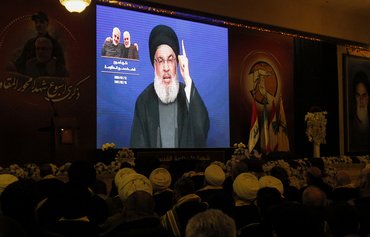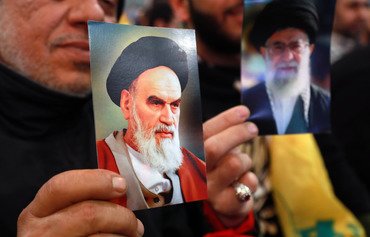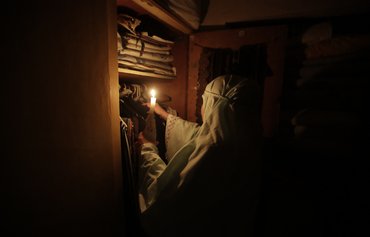BEIRUT -- In a recent speech, Lebanese Hizbullah chief Hassan Nasrallah lavished praise on Iran, claiming it is "more powerful than ever" and downplaying the crushing economic crisis and domestic instability it is facing.
In a speech delivered October 1, Nasrallah sought to portray the Islamic Republic as a victim of the West, while also issuing baseless claims that the country is suffering no ill effects from sanctions and has no regional ambitions.
Analysts reviewing the text of his speech, in which he also downplayed the protest movement that has roiled Iran and ignited global support for its people, described his assertions as both inaccurate and laughable.
His warning to the Iraqi people against "demonising Iran" and assertion that "Iran does not want anything from the regional peoples" reveal Nasrallah to be no more than a puppet for Iranian leader Ali Khamenei, they said.
And as for the "sacrifices" Nasrallah claimed Iran has made "for the sake of Iraq" and the people of the region, they noted, these are hardly selfless gestures made without political calculation on the part of the Islamic Republic.
Commenting on Nasrallah's speech, political analyst and Hizbullah opponent Harith Suleiman said it "confirms that he takes cues from" Khamenei.
Regarding Nasrallah's claim that Iran has no expansionist dreams in the region, Suleiman said "this is contrary to the statements of Iranian officials and clerics, who say Iran's borders now reach the Mediterranean Sea".
Nasrallah's claim contradicts the reality of the situation, political activist and analyst Elias al-Zoghbi told Al-Mashareq.
"Iran is not a charitable organisation or a wealthy country" that could help Yemen, Iraq, Syria or Lebanon, he said -- yet it has armed proxies overseen by its Islamic Revolutionary Guard Corps (IRGC) in each of these nations.
"Iran has repeatedly boasted of its control over four Arab capitals," he added.
Furthermore, he said, it is "economically exploiting the bounties of these countries, including Iraqi and Syrian oil and what is left of Lebanon's economic vigor, to cover its military expenditures".
Iran also has exploited Arab countries by using their air and sea ports and border crossings to smuggle arms to Hizbullah and other Iranian proxies in Syria, Iraq and Yemen, al-Zoghbi said.
Iran's waning influence
According to Lebanese Centre for Research and Consulting director Hassan Qutb, Nasrallah's recent speech was aimed at calming Hizbullah supporters who are concerned about Iran's waning power and dominance in the region.
Nasrallah's propaganda includes "the directives he and his leaders issue, both in Lebanon and Iran, claiming that defeating Iran's axis is not possible, and that Iran is in a stable condition, which is untrue", he said.
Despite Nasrallah's denial of the Iranian regime's ambitions and economic interest in the Middle East, Qutb said the people of the region are well aware of Iran's expansionist dreams, and are beginning to comprehend their scale.
While Nasrallah defends Iran's foreign policies and tries to deny it has regional ambitions, the Iranian regime's affiliates "in all Arab countries, especially Lebanon, Syria, Iraq and Yemen" expose this as falsehood.
Iran's regional meddling and regional ambitions also can be seen in Bahrain and other countries where it supports various groups, he said.
As his recent speech indicates, Qutb said, Nasrallah is in a weak position, and is trying to deny the expansionist ambitions of the Iranian regime while defending the Islamic Republic out of loyalty.

![Hizbullah leader Hassan Nasrallah delivers a speech in Beirut's southern suburb on August 22. [Anwar Amro/AFP]](/cnmi_di/images/2022/10/13/37807-nasrallah-speech-600_384.jpg)






